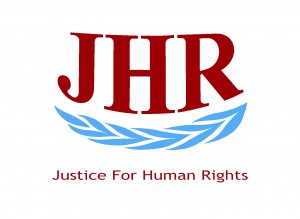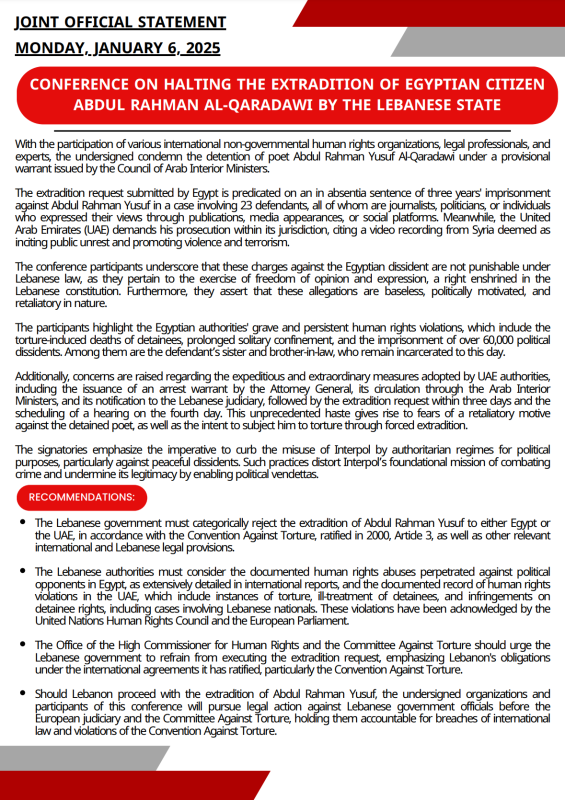Monday, January 6, 2025
Conference on Halting the Extradition of Egyptian Citizen Abdul Rahman Al-Qaradawi by the Lebanese State
With the participation of various international non-governmental human rights organizations, legal professionals, and experts, the undersigned condemn the detention of poet Abdul Rahman Yusuf Al-Qaradawi under a provisional warrant issued by the Council of Arab Interior Ministers.
The extradition request submitted by Egypt is predicated on an in absentia sentence of three years’ imprisonment against Abdul Rahman Yusuf in a case involving 23 defendants, all of whom are journalists, politicians, or individuals who expressed their views through publications, media appearances, or social platforms. Meanwhile, the United Arab Emirates (UAE) demands his prosecution within its jurisdiction, citing a video recording from Syria deemed as inciting public unrest and promoting violence and terrorism.
The conference participants underscore that these charges against the Egyptian dissident are not punishable under Lebanese law, as they pertain to the exercise of freedom of opinion and expression, a right enshrined in the Lebanese constitution. Furthermore, they assert that these allegations are baseless, politically motivated, and retaliatory in nature.
The participants highlight the Egyptian authorities’ grave and persistent human rights violations, which include the torture-induced deaths of detainees, prolonged solitary confinement, and the imprisonment of over 60,000 political dissidents. Among them are the defendant’s sister and brother-in-law, who remain incarcerated to this day.
Additionally, concerns are raised regarding the expeditious and extraordinary measures adopted by UAE authorities, including the issuance of an arrest warrant by the Attorney General, its circulation through the Arab Interior Ministers, and its notification to the Lebanese judiciary, followed by the extradition request within three days and the scheduling of a hearing on the fourth day. This unprecedented haste gives rise to fears of a retaliatory motive against the detained poet, as well as the intent to subject him to torture through forced extradition.
The signatories emphasize the imperative to curb the misuse of Interpol by authoritarian regimes for political purposes, particularly against peaceful dissidents. Such practices distort Interpol’s foundational mission of combating crime and undermine its legitimacy by enabling political vendettas.
Recommendations:
The Lebanese government must categorically reject the extradition of Abdul Rahman Yusuf to either Egypt or the UAE, in accordance with the Convention Against Torture, ratified in 2000, Article 3, as well as other relevant international and Lebanese legal provisions.
The Lebanese authorities must consider the documented human rights abuses perpetrated against political opponents in Egypt, as extensively detailed in international reports, and the documented record of human rights violations in the UAE, which include instances of torture, ill-treatment of detainees, and infringements on detainee rights, including cases involving Lebanese nationals. These violations have been acknowledged by the United Nations Human Rights Council and the European Parliament.
The Office of the High Commissioner for Human Rights and the Committee Against Torture should urge the Lebanese government to refrain from executing the extradition request, emphasizing Lebanon’s obligations under the international agreements it has ratified, particularly the Convention Against Torture.
Should Lebanon proceed with the extradition of Abdul Rahman Yusuf, the undersigned organizations and participants of this conference will pursue legal action against Lebanese government officials before the European judiciary and the Committee Against Torture, holding them accountable for breaches of international law and violations of the Convention Against Torture.


